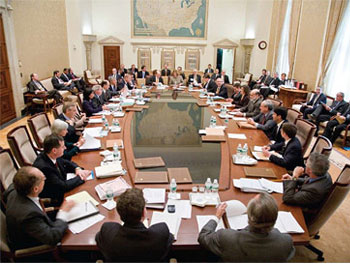 So Ben Bernanke confirmed that the Fed may have to turn to interest paid on excess reserves as its main policy tool rather than targeting the federal funds rate. Bernanke says such a move would only last until normalcy returns to the Fed’s balance sheet or, equivalently, excess reserves return to their pre-crisis levels. Mark Thoma provides an informative discussion of this process that shows how the discount rate, federal funds rate, and interest paid on excess reserves interact in a supply and demand graph for bank reserves. Here is what some Wall Street economists had to say about this potential change in Fed policy. And here is what Josh Hendrickson had to say on the matter:
So Ben Bernanke confirmed that the Fed may have to turn to interest paid on excess reserves as its main policy tool rather than targeting the federal funds rate. Bernanke says such a move would only last until normalcy returns to the Fed’s balance sheet or, equivalently, excess reserves return to their pre-crisis levels. Mark Thoma provides an informative discussion of this process that shows how the discount rate, federal funds rate, and interest paid on excess reserves interact in a supply and demand graph for bank reserves. Here is what some Wall Street economists had to say about this potential change in Fed policy. And here is what Josh Hendrickson had to say on the matter:
As I previously discussed, the interest on reserves methodology is a rather crude way to solve the problem. If the problem is with excess reserves, then the reserves should be removed from the system using normal open market operations. So why isn’t the Fed employing this method? Well, I have long suspected that the reason the Fed was employing this strategy was because of the change in the composition in the Fed’s balance sheet away from traditional Treasury holdings and toward mortgage backed securities. This view is confirmed in the WSJ:
Plans for the Fed’s portfolio of mortgage-backed securities are another element of the internal debate over the exit strategy from super-cheap money. The Fed is on course to buy up to $1.25 trillion of the securities, in an effort to hold down mortgage rates and buoy housing.
Over time, officials want to reduce these holdings and return to holding U.S. Treasury securities as the Fed’s primary asset. But they are reluctant to take steps that might push mortgage rates higher and damage the still-fragile housing market. Eventually, they could gradually sell mortgage securities, but such a move would be unlikely in the early stages of tightening.
So, ultimately, the Fed is conducting fiscal policy by subsidizing mortgage rates. What’s more, given that open market operations would necessarily require not only open market sales of Treasury securities, but also mortgage backed securities, the Fed finds itself in a position in which open market operations are politically and practically infeasible.
- Bulenox: Get 45% to 91% OFF ... Use Discount Code: UNO
- Risk Our Money Not Yours | Get 50% to 90% OFF ... Use Discount Code: MMBVBKSM
Disclaimer: This page contains affiliate links. If you choose to make a purchase after clicking a link, we may receive a commission at no additional cost to you. Thank you for your support!


Leave a Reply